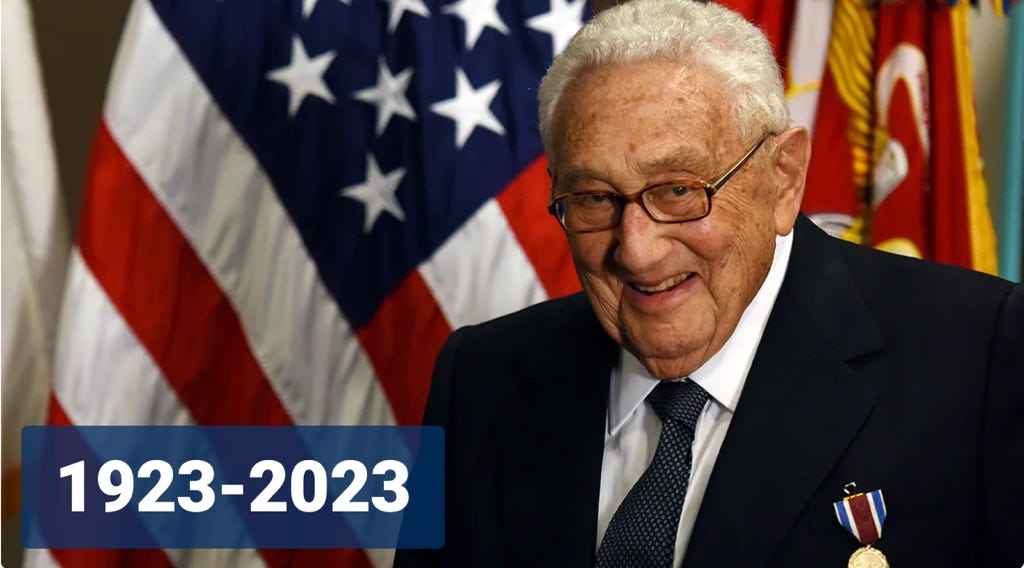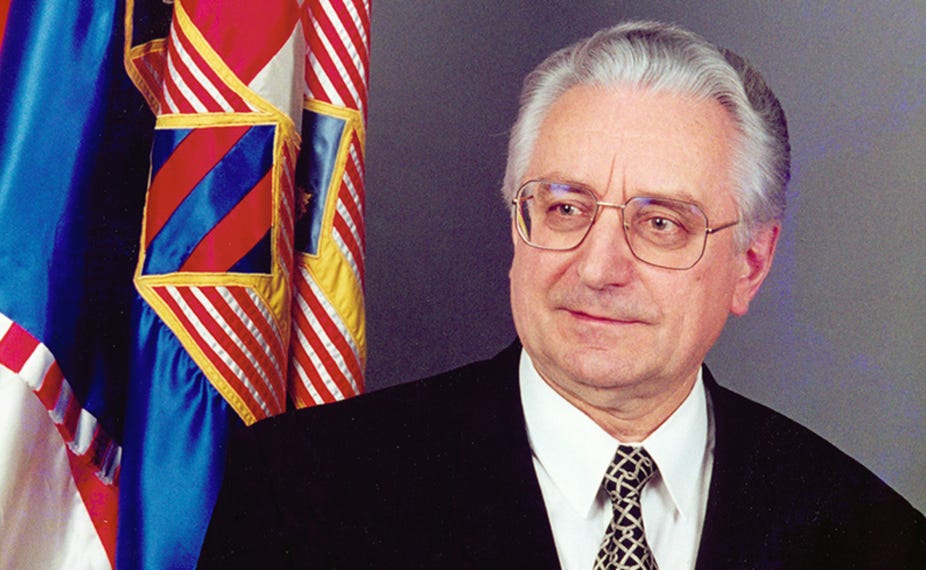Dorothy S. McClellan

Henry Kissinger
Former U.S. Secretary of State, Nobel Peace Prize winner
and the architect of the New World Order died at the age of 100
Kissinger was the only person ever to serve as White House National Security Adviser and Secretary of State at the same time, exercising control over U.S. foreign policy that few could have had without being president.
In particular, he helped create a "post-World War II world order," leading the United States through significant foreign policy challenges.
On July 20 this year, during a surprise visit to Beijing, he met with Chinese Communist Party (CCP) leader Xi Jinping. Kissinger is respected in China for initiating the opening of relations between the CCP and Washington under President Nixon during the Cold War in the early 1970s. By transferring manufacturing facilities and technologies from America to China, the latter has made it an economic superpower, hoping that China will replace its currency with the U.S. dollar, thereby strengthening and consolidating America on a global scale.
Heinz Alfred Kissinger was born in Furth, Germany on May 27, 1923 to a Jewish family with whom he moved to the U.S. in 1938. He changed his name to Henry, served in the Army in Europe in World War II, and received his Doctorate from Harvard in 1954, which he worked on for many years. After nearly a decade of engagement in high U.S. diplomacy, Kissinger founded a consulting firm, Kissinger Associates, in New York in 1982, which offered advice to the world's corporate elite.
He was a member of the boards of directors of companies and various foreign policy and security forums, and has written numerous books in the fields of national security, diplomacy and international relations.
Henry Kissinger and Franjo Tuđman
A conversation between the Croatian delegation led by Dr. Franjo Tuđman and Henry Kissinger was held on October 1, 1990 in the office of the international advisory and lobbying company Kissinger Associates, Inc. President Tudjman especially looked forward to meet Kissinger because he was convinced that Kissinger was by far the most influential American politician and the best expert on American geostrategic concepts and visions in the world. He especially appreciated his book "Renewed World," translated into Croatian in 1976 by Krešimir Fijačko.
In addition, President Tudjman had a personal, sentimental reason to meet Kissinger. Back in 1966 he participated in the work and was one of the speakers at the International Seminar series at Harvard University of which Kissinger was the director from 1952 to 1969. At the beginning of the meeting, President Tudjman reminded Kissinger of this fact.
Kissinger received the information with a warm, knowing smile, pointing out that the Harvard international seminars greatly helped him in getting to know first-hand the specific circumstances in certain countries during the Cold War, including the situation in Yugoslavia.

President Tuđman presented Kissinger with an English translation of the Draft Confederate Treaty. The full title of this document was the Draft Treaty on Yugoslav Confederation – Alliance of Yugoslav Republics, and its main author was Professor of International Law Dr. Vladimir Đuro Degan. Kissinger took the translation in his hands and spent about ten minutes flipping through and reading the document hastily. After that, Kissinger responded with a request asking what the Croatians actually aspire to and what their formulation is of an international treaty on the association of independent and independent state-republics when Yugoslavia exists as a sovereign and internationally recognized state.
President Tuđman and Prof. Slaven Letica explained to him that the Constitution of the SFRY of 1974 has many confederal provisions on the statehood of republic-states, including the right of people to self-determination, secession and the creation of an independent state. Consistently, but also in line with the long tradition of Croatia's efforts to establish its own state, even as part of the confederal structure of Yugoslavia, the chapter of the Principles of the aforementioned and translated document stated that the future union of states is created on the basis of the inalienable and non-expendable right of each people to self-determination, including the right to secede and association with other peoples and states.
Kissinger, after their further explanations, told them with a smile: As far as I can see, you actually want to create a sovereign state. No matter what I think about it, whether this option is today possible, you have expressed this aspiration and demand quite clearly. President Tuđman and Prof. Letica then explained in detail that this aspiration in the confederal treaty was quite clearly expressed, and that this is evidenced by the fact that Croatia is facing aggressive verbal criticism by Greater Serbian propaganda, the Yugoslav People's Army, and the regime of Slobodan Milosevic, but also criticism of rigid communist and Yugoslav forces in Croatia itself.
President Tudjman was interested in how Kissinger personally viewed the possibility, even the inevitability, of the disintegration of the communist quasi-federations of the SFRY and the USSR. Kissinger replied that he personally considered the possibility of the breakup of Yugoslavia, but he did not consider this breakup desirable from the perspective of the stability of the international order and from the perspective of American national interests. America's historical interest, he said, has been achieved by the collapse of the Berlin Wall and communism and the development of democracy and capitalism, and anything beyond that is an internal matter of these countries. He added:"I hope you are aware of the fact that states are not created and dissolved without war.
Tudjman replied: Unfortunately, your life experience and mine say that you are probably right, but the principled position of the United States that it supports the aspirations of the people of Yugoslavia for freedom could significantly reduce the risk of war. In the continuation of the conversation, Tudjman explained to him why the existing neutral position of the United States, which supports the integrity of the SFRY and the USSR, actually encourages hegemonic, conquering, aggressive, warrior aspirations and threats from Serbia and Russia.
Henry Kissinger once wrote in a letter to Franjo Tuđman: Mr. President, like all great men, in your lifetime you will not wait for a proper interpretation of your merits from the people, only future generations will do so, but believe me, they will do so. You will be a great man in Croatian history, but not in your lifetime, but when the grades are given with a cool head.
All Content © 2015 Croatian Film Institute, All Rights Reserved